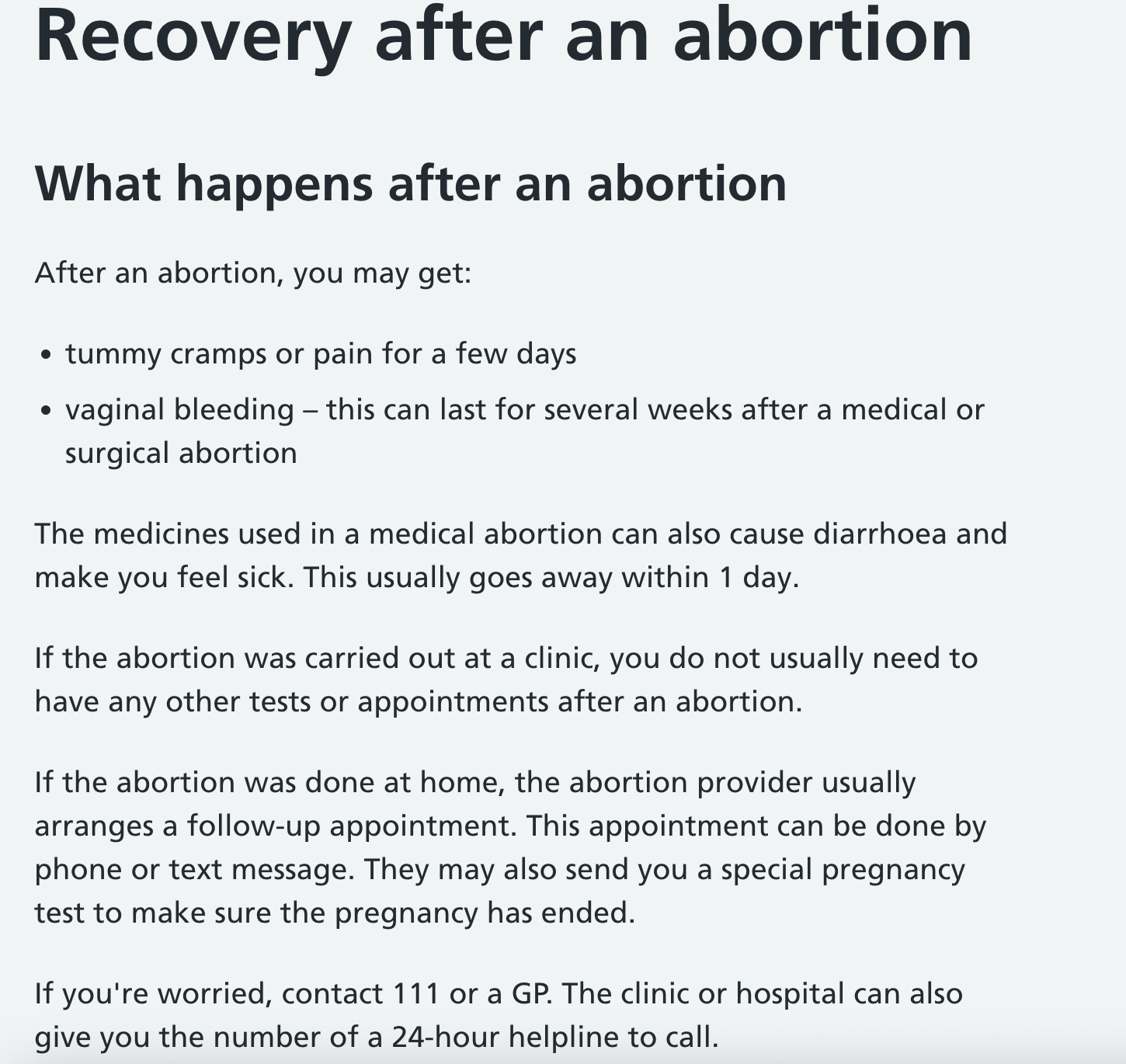We need to talk about what they don’t tell you about abortion
A termination is an ending, but no one warned me that it was just the start of what it would do to my body.
Words by Anonymous

At first, I thought I got off pretty lightly from my abortion. Granted, it hurt enough to have you googling how to enter the nunhood, but then it only lasted 10 minutes. I’d been about seven or eight weeks pregnant, after my period cup pulled my copper coil out without me noticing.
The the day after the termination on day one was about equivalent to day three or four of my period. I took the next day off work; the rest of the week I worked from home with a hot water bottle stuffed down a big pair of trousers to deal with moderate-to-bad cramps. I went for a small run two days later, and a big run four days later. I was surprised at how easily I got away with it.
That weekend, oddly part way through a showing of Anora, I found myself suddenly overcome with anger about having let someone off the hook when they made a totally inappropriate comment about the matter. It dawned on me that I had put someone else’s social comfort above my wellbeing when I’d had to endure probably the worst day of my life, and that I owed myself more than that. I was surprised again. I didn’t think it had affected me that much.
As I rolled into the next week, I started being overwhelmed by a lot more feelings, few of them so lucid. I kept crying for no reason. I felt isolated, furious and self-destructive. To be clear, none of this was to do with having made the decision to terminate: that was the most straightforward part, both for me and my partner, and out of foresight for a life we are not currently positioned to raise.
‘One night home alone, I sobbed at the thought that no one cared about me.’
One night home alone, I sobbed at the thought that no one cared about me. The next morning I remembered that the number of people who offered to come to the appointment with me could have filled out a professional football team. Silly. At one gig, I started to feel so shut down that afterwards I couldn’t look my boyfriend in the eye in the pub as I knew I would cry; at another, I sobbed throughout the entire thing, incapable of stopping.
At the abortion, I asked how long it takes your body to forget that you’ve been pregnant. They said four or five days: fine. But three weeks later, I was still subject to what were clearly surges of hormonal readjustment, presumably from both the fleeting pregnancy hormones bombing out of my body as well as my cycle juicing itself back into action after almost two months of dormancy. It felt like divine, if awful, luck to learn that a friend had had an abortion the week before me, and we compared notes on how irrational and insane we felt.
Throughout these wild vicissitudes of emotion, another feeling started to starkly blaze through: profound anger at how minimised these experiences are, even in the NHS literature. At the termination I was told no baths and no sex for two weeks, and given a booklet that said that you could drive home after any procedure involving local anaesthetic, as mine was. I took the train home and slept for two hours. I would surely have crashed if I had tried to drive home for an hour through London traffic.
It also said you could go to work the next day. I had told my immediate (male) colleagues what I was going through as lying seemed like another unnecessary level of administration on top of the almost full-time job of arranging an abortion, and I trusted that they would get it. I took two days off, but in retrospect probably could have done with two weeks. For any person seeking abortion who doesn’t feel they can, or want, to tell their place of work, or is subject to inflexible rotas or zero-hours contracts, guidance like this could easily compel them back before they feel able, to avoid suspicion – or worse, sanctions – over asking for more time off.
The final pages featured a paragraph about abortion and mental health. It said that most women were unaffected by termination, but that it may exacerbate existing mental health issues. I feel extraordinarily fortunate not to have any prevailing mental health issues yet still felt annihilated by the aftermath, unable to trust what were my true feelings and what was chemical insurgency. At worst, I flung my phone across my bedroom (into a pile of clothes). Really, though, the force of feeling made me want to hoist a Lime bike over my head and slam it into the canal.
One afternoon in December I found myself out of the house with nothing to read and time to kill, and went to a bookshop on a whim. Matresence by Lucy Jones, about the psychological and physical changes wrought by pregnancy, jumped out from the science literature table. I had been meaning to read it for ages. I am a firm believer that sometimes books or films or music find you exactly when they’re meant to, which is what happened. I read it like a thriller, so grateful for Lucy’s insight into how pregnancy literally changes the shape of the brain, never mind what goes on in it. She was writing about pregnancy rather than abortion, though I found vast relief in any affirmation of the psychedelic changes that conception, whether realised or abbreviated, can have on the body.

As well as wanting authoritative acknowledgement of these changes, I also realised how incapable I had been of giving it to myself, preferring to think I was above it all – feminine pain or whatever; hormones – and wouldn’t be affected by the experience. (I have to admit that I am very lucky on the period front and suffer neither PMS nor regular pain.)
During the procedure, when the kind nurses holding my hands told me I was doing really well, I wondered if I really was great at this or if they were just being nice. I guiltily remembered a passage from Zadie Smith’s Intimations about her refusal to accept that she was subject to cyclical sways. ‘My moods were my own,’ she wrote. ‘They had no reflection in nature.’ Maybe it was internalised misogyny, she writes. ‘But at the hot core of it there was an obsession with control, common among my people (writers).’ Rude! (True.)
I arranged two sessions with my old therapist to help work out how I was meant to feel about the experience, and she remarked on how I used language of violence and disgust to talk about my body and my fears of what it might do next, without warning. Maybe she was right. So was my friend in the same boat, who said being at the mercy of her body had been ‘humbling’. Having struggled to communicate the complicated details of how I had accidentally got pregnant to repeated healthcare specialists, who apparently never seemed to have my notes, I realised that if I didn’t learn to back myself in these situations – to come to terms with the biological realities of my body – I didn’t stand a chance, especially in a culture that minimises reproductive experiences (and significantly more so for women of colour). Maybe it was OK to accept that it actually all been really, really hard.
Nearly three months later, I feel entirely myself again. If there is a positive lasting vestige in my day to day life, it’s a newfound ability not to react to surprise emotions, and instead to sit with them a while and think about why I feel this way: what disparate factors are feeding this? Are they worth listening to? Am I just being a little bit insecure and actually everything’s probably fine? (Often, yes.)
That, and feeling radicalised about a culture that encourages women and birthing people to downplay their experiences to the point of self-doubt. I understand why many people who have had abortion don’t want to talk about something so intimate; many may feel confined to silence given a hush around termination that still entrenches it as a taboo subject. But society preserving this as a private pain denies establishing a sense of scale to measure against, especially as someone attempts to readjust in an unpredictable aftermath.
As with many aspects of fertility and pregnancy, maybe the medical establishment just doesn’t want to scare anyone unduly – some people will have an easier time than I did, others significantly worse – but it’s a lot scarier being strapped to the prow of an untrustworthy ship with no idea what’s happening. A termination is an ending, but no one warned me that it was just the start of what it would do to my body.
Photo: Unsplash/NHS Website

